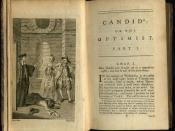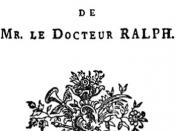During Voltaire's lifetime, traditional social institutions and government systems held power. Arguably the most influential of those was the Catholic Church, which was considered sacred and above the state in authority and importance. Although Voltaire was a deist, he despised the Church clergy for its corruption, impiousness, and hypocrisy. Having been sexually used by teachers while attending a Jesuit school, he harbored a special hatred towards the Jesuits. Yet his abhorrence of religion extended past Catholicism. Voltaire condemned Protestant clergy in much the same way as Catholic priests. Furthermore, although in theory Voltaire believed in religious equality, he held strongly anti-Semitic views, even calling Jews "abominable" in his Dictionary of Philosophy. Muslim clerics were described in much the same way. Clearly, Voltaire hated all religious institutions and customs. In his most satirical and important work, Candide, he incessantly mocks not only the Catholic Church, but also Protestants, Jews, and Muslims.
Voltaire's sharpest criticism was directed at the Catholic Church. His relationship with the Church "was one of uninterrupted hostility" (Candide, "Religion", pg. 13), and in Candide, he attacks all aspects of its social structure and doctrines. When Pangloss explains how he contracted syphilis, he states that Paquette "received this present from a very learned Franciscan monk...who owed it to a marquise...who caught it from a Jesuit" (Candide, Chapter 4, pg. 48). This passage, apart from being a parody of Bible genealogies, illustrates the lack of celibacy of respectable Church members, contrary to their own doctrines. Voltaire shows the promiscuity of the Catholic clergy in several other instances, such as through the Grand Inquisitor who hypocritically has a mistress, Cunegonde. The author also introduces the daughter of a Pope, who fails to help her out of her hardships. In Chapter Ten, Cunegonde's jewels are stolen by "a venerable...


